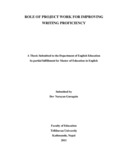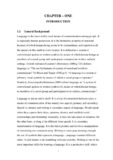Please use this identifier to cite or link to this item:
https://elibrary.tucl.edu.np/handle/123456789/3594| Title: | Role of Project Work for Improving writing Proficiency |
| Authors: | Guragain, Dev Narayan |
| Keywords: | english grammar;language training |
| Issue Date: | 2011 |
| Publisher: | Faculty of Management |
| Institute Name: | Central Department of Education |
| Level: | Masters |
| Abstract: | The present study aims to improve writing proficiency of the students of gradeeight through the project work.Main focus of the study was directed on howeffectively students can improve their writing and what problems are withregard to communicative ends of learning English as foreign language. Thestudy, being action research, is believed to be relevant inoffering a realisticpicture of the impact ofrole of project work for teaching writing andto suggestpossible measures in the campaign of makingit a result oriented discipline. Thestudy was carried out using both primary and secondary sources of data.Forprimary data, class eight students of an English medium school were taughtEnglish writing by the researcher in direct involvement and their action(problems, actions and solutions) were recorded in rough sketch which weredaily translated into the report formats. As teaching writing is taken as astressful liability on the part of teachers and students, the study bears the factsof betterroleofproject workfor teaching Englishwriting in the sense that allthe students passed the test andfew students scored thehighest marks. Only afew students showed problems in spellings and use of correct words.Thestudents also showed positive results. Thisthesisisdivided into four main chapters. The first chapter contains generalbackground,writing, characteristics of good writing, stages of development ofwriting, importance of writing, purposes of writing, testing of writing,components of writing, mechanics of writing, action research and project work.The second chapter deals with the methodology adopted to carry out the studysuch as the sources of data, sample population, sampling procedure, tools fordata collection, anddata collection procedures. This chapter also states the limitationsof the study. The third chapter presents analysis and interpretationofthe data. The fourth chapter consists of the findings and recommendationsbased on the analysis and interpretationof data. References and appendixes areattached at the end. |
| URI: | http://elibrary.tucl.edu.np/handle/123456789/3594 |
| Appears in Collections: | English Language Education |
Files in This Item:
| File | Description | Size | Format | |
|---|---|---|---|---|
| COVER.pdf | 33.8 kB | Adobe PDF |  View/Open | |
| CHAPTER.pdf | 285.35 kB | Adobe PDF |  View/Open |
Items in DSpace are protected by copyright, with all rights reserved, unless otherwise indicated.
